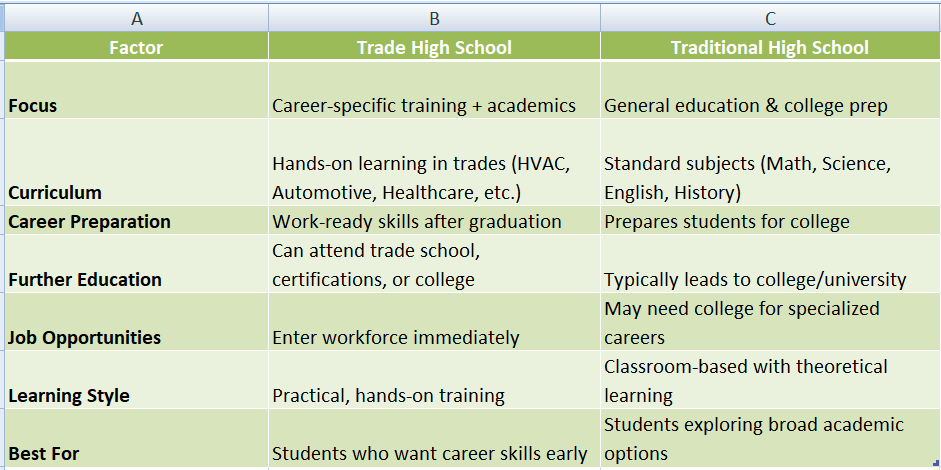
Understanding Trade High Schools and Their Benefits
Understanding Trade High Schools and Their Benefits Trade high schools provide a distinctive educational experience that merges traditional academics with hands-on training in skilled trades. These institutions emphasize vocational training programs, preparing students for immediate employment in fields like plumbing, electrical work, and carpentry. By combining practical skills with theoretical knowledge, trade high schools equip students for success in the workforce.
For example, aspiring electricians can gain valuable real-world experience through apprenticeships, allowing them to earn while they learn. The advantages of attending a trade high school are significant and can greatly influence a student’s future. Here are some key benefits:
- Job Readiness: Graduates are often job-ready, equipped with in-demand skills.
- Cost-Effective Education: Trade schools generally have lower tuition than traditional colleges, making them appealing to many families.
- Strong Job Placement Rates: Many vocational programs collaborate with local businesses, resulting in high job placement rates for graduates.
- Hands-On Learning: Students participate in practical training that enhances their skill retention and competence in their chosen field.
Ultimately, choosing to attend a trade high school should align with your career aspirations. If you are passionate about a specific trade and want to enter the workforce quickly, these schools can offer a solid foundation for a successful career.
Unlock your potential with online degrees—Learn more!
Key Skills You Can Learn at Trade High Schools
When deciding if trade high schools are the right fit for you, it’s crucial to recognize the valuable skills these programs offer. Trade high schools emphasize practical, hands-on experience across various fields, preparing students for immediate workforce entry or further vocational training. This method not only imparts technical skills but also nurtures critical thinking and problem-solving abilities essential for any career. Key skills you can develop at trade high schools include:
- Technical Proficiency: Students gain real-world experience in areas like plumbing, electrical work, and automotive repair, setting them apart in the job market.
- Workplace Readiness: Programs often include soft skills training, such as communication and teamwork, vital for effective collaboration, especially in union trades apprenticeships.
- Industry Certifications: Many vocational training programs allow students to earn recognized certifications, enhancing their resumes and employability.
- Networking Opportunities: Trade high schools frequently connect students with local businesses, offering internships and job placements that can be invaluable as they begin their careers.
In summary, trade high schools provide a unique combination of technical training and essential life skills, making them an excellent choice for students eager to enter the workforce quickly and effectively. If you are ready to explore a specific trade, these schools can lay the groundwork for a successful career.
How Trade High Schools Prepare Students for Careers
Trade high schools provide a distinct pathway for students eager to enter the workforce with practical skills. Unlike traditional high schools that primarily focus on academics, these institutions emphasize hands-on learning and real-world applications. This approach not only prepares students for immediate employment but also equips them with foundational skills for future career advancement.
For example, students in vocational training programs engage in projects that reflect actual job tasks, offering a glimpse into their future careers. A notable feature of trade high schools is their strong connections with local industries. Many programs collaborate with businesses to offer internships and apprenticeships, enhancing learning and helping students build valuable networks. Here are some key benefits of attending a trade high school:
- Hands-on Experience: Students acquire practical skills directly applicable in the workforce.
- Industry Connections: Partnerships with local businesses can lead to job placements.
- Focused Curriculum: Programs are tailored to meet specific trade demands, ensuring relevance.
- Career Readiness: Graduates often have a competitive edge in the job market compared to peers from traditional schools.
Additionally, many trade high schools provide pathways into union trades apprenticeships, allowing students to learn while earning a wage. By graduation, students are equipped with technical skills and a clear understanding of workplace expectations. If you are contemplating whether a trade high school is right for you, consider your career goals and how these programs can help you achieve them.
Exploring the Different Programs Offered by Trade High Schools
When deciding if trade high schools are the right choice for you, it’s crucial to examine the diverse programs they offer. These schools emphasize hands-on experience and practical skills in specific fields, preparing students for immediate employment and paving the way for vocational training programs or union trades apprenticeships. Imagine being in a classroom where you engage in real projects that reflect actual workplace scenarios. Some popular programs at trade high schools include:
- Automotive Technology: Learn to diagnose and repair vehicles, gaining in-demand skills.
- Culinary Arts: Immerse yourself in cooking and baking, setting the stage for a career in restaurants or catering.
- Welding and Fabrication: Acquire welding skills that lead to opportunities in construction and manufacturing.
- Electrical and Plumbing: Receive training in essential systems, ensuring stable job prospects.
- Cosmetology: Delve into beauty and hair care, preparing for a career in salons or spas. Opting for a trade high school means choosing a focused educational path. The combination of classroom learning and practical application is highly beneficial.
Many programs also connect students with local businesses, facilitating internships or job placements after graduation. If you are eager to kickstart your career and thrive in a hands-on learning environment, trade high schools could be the ideal choice for you.
The Importance of Hands-On Experience in Trade Education
When deciding if trade high schools are the right choice for you, the focus on hands-on experience stands out. Unlike traditional academic paths, trade education emphasizes practical skills that prepare students for immediate employment across various fields. This method not only enhances learning but also boosts confidence as students apply their knowledge in real-world situations.
Benefits of Hands-On Experience in Trade Education:
- Immediate Skill Application: Learning by doing helps students grasp concepts more effectively.
- Industry-Relevant Training: Programs are often designed with input from local businesses, ensuring that the skills taught are in demand.
- Networking Opportunities: Trade high schools connect students with industry professionals, facilitating future job placements.
- Increased Employability: Graduates from vocational training programs are often in high demand, as employers value practical experience alongside academic knowledge.
For instance, students in union trades apprenticeships gain invaluable experience working with seasoned professionals. This not only enhances their technical skills but also provides insights into workplace dynamics. By graduation, they are not just job-ready; they possess a robust portfolio showcasing their abilities. If you thrive in hands-on environments and are eager to jumpstart your career, trade high schools could be the perfect fit for you.
Trade High Schools vs Traditional High Schools: A Comparison
When choosing your educational path, it’s essential to compare trade high schools and traditional high schools. Trade high schools offer hands-on experience in specific fields like plumbing, electrical work, or culinary arts, making them ideal for students who thrive in practical environments and want to enter the workforce quickly. In contrast, traditional high schools focus on a broader academic curriculum, preparing students for college or university. Both options have their advantages, so understanding your goals is crucial for making the right choice. Here are some key benefits of attending a trade high school:
- Hands-On Learning: Students gain practical training relevant to their future careers.
- Early Career Entry: Vocational training programs often allow students to start working in their fields right after graduation.
- Union Trades Apprenticeships: These programs can lead to apprenticeships, providing a clear path to well-paying jobs in skilled trades.
- Job Security: Skilled trades are in high demand, offering graduates stable career options.
Ultimately, the choice between trade and traditional high schools should reflect your interests and career aspirations. If you are passionate about a specific trade and eager for practical skills, a trade high school may be the right fit. Conversely, if you prefer a more generalized education with options for higher education, a traditional high school could be better suited for you.

Unlock your potential with online degrees—Learn more!
Success Stories: Graduates of Trade High Schools
When deciding if trade high schools are the right fit for you, it’s valuable to consider the success stories of their graduates. Many students discover that these schools not only equip them with practical skills but also lead to fulfilling careers. For example, one graduate became a licensed electrician through a union trades apprenticeship, gaining hands-on experience and a competitive salary right after graduation. Here are some key benefits graduates often mention about their trade high school experience:
- Real-World Skills: Students acquire practical knowledge applicable in the workforce.
- Job Readiness: Programs are designed to prepare students for immediate employment, bridging the gap between education and work.
- Networking Opportunities: Trade schools connect students with local businesses and unions, offering valuable contacts.
- Financial Independence: Graduates often report higher starting salaries than those who pursued traditional college degrees.
These success stories show that trade high schools can be an excellent choice for students who thrive in hands-on learning environments. With vocational training programs tailored to various industries, students can find their niche and succeed in careers that align with their interests and skills. Ultimately, the decision hinges on your personal goals and vision for the future.
Read Also: What Are the Top Platforms for Personalized Learning?
Financial Considerations for Attending Trade High Schools
Financial considerations are vital when deciding if trade high schools are the right fit for you. These schools often present a more affordable alternative to traditional colleges, with tuition significantly lower than that of four-year universities. This affordability allows students to graduate with less debt. Moreover, vocational training programs typically offer hands-on experience, leading to immediate job opportunities after graduation, which promotes financial independence sooner. Here are key financial aspects to consider when evaluating trade high schools:
- Lower Tuition Costs: Trade schools usually charge less than traditional colleges, making them budget-friendly.
- Shorter Programs: Many vocational programs can be completed in two years or less, enabling quicker entry into the workforce.
- Earning Potential: Graduates often secure jobs in high-demand fields like plumbing or electrical work, which offer competitive salaries.
- Apprenticeship Opportunities: Union trades apprenticeships allow you to earn while you learn, easing educational financial burdens.
- Financial Aid Options: Many trade schools provide scholarships and financial aid, making education more accessible.
Ultimately, choosing to attend a trade high school should align with your career aspirations and financial situation. If you aim to work in a skilled trade and wish to minimize student debt, trade high schools can be an excellent choice. With thorough research and planning, you can find a program that fits your budget and leads to a rewarding career.
Is a Trade High School Right for Your Career Goals?
Choosing the right educational path can be challenging, especially when deciding if a trade high school suits your career goals. Trade high schools specialize in practical skills and hands-on training, preparing students for immediate workforce entry. If you enjoy working with your hands and have a passion for trades like plumbing, electrical work, or automotive repair, a trade high school may be ideal for you. Here are some key benefits of attending a trade high school:
- Focused Curriculum: Programs are tailored to specific industries, ensuring you acquire relevant skills that employers seek.
- Hands-On Experience: Many programs offer apprenticeships or practical training, allowing you to apply your knowledge in real-world settings.
- Job Readiness: Graduates are often job-ready, with many employers actively looking for candidates with vocational training.
- Potential for High Earnings: Skilled trades can provide competitive salaries, often exceeding those of traditional four-year college graduates.
If you are considering this path, reflect on your interests and career aspirations. Research vocational training programs and union trades apprenticeships to find the right fit. Speak with industry professionals and visit schools to gauge the environment. Ultimately, your decision should align with your personal goals and the type of work you envision for your future.
Unlock your potential with online degrees—Learn more!
FAQs
-
What is a trade high school?
A trade high school is a secondary school that offers career and technical education (CTE) alongside traditional academics, preparing students for skilled trades. -
How is a trade high school different from a regular high school?
Unlike regular high schools that focus mainly on academic subjects, trade high schools provide hands-on training in specific career fields such as healthcare, construction, automotive repair, and information technology. -
Who should consider attending a trade high school?
Students interested in gaining practical job skills, starting a career early, or working in a trade-focused industry should consider attending. -
What grades do trade high schools typically serve?
Most trade high schools start in 9th grade and continue through 12th grade, just like traditional high schools.




